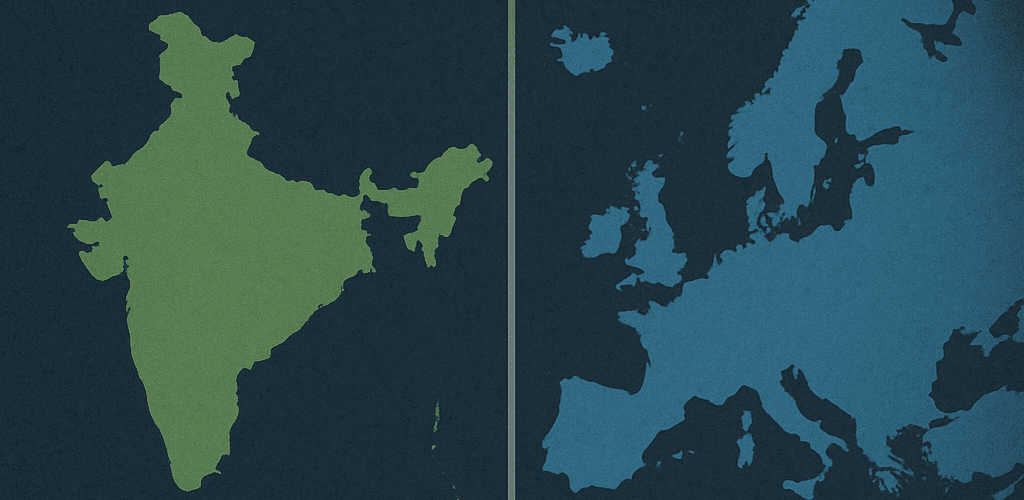Two Laws. Two Continents. One CEO Nightmare.
The investor call had just ended.
The founder, still riding the dopamine wave of a successful funding announcement, turned to his legal counsel and asked:
“We’ve got users in India and Europe. We’re compliant with GDPR, right? So that covers DPDP too?”
The lawyer paused.
Then delivered the blow:
“Not exactly. DPDP is its own beast.”
Welcome to the regulatory reality of 2025.
If you’re building a startup with global ambitions or cross-border users, you need to understand the difference between India’s DPDP Act and Europe’s GDPR—or risk fines, platform suspensions, or worse, loss of user trust.
DPDP and GDPR: Same DNA, Different Skeletons
At first glance, the Digital Personal Data Protection Act (DPDP) and the General Data Protection Regulation (GDPR) look like cousins. Both:
- Focus on individual consent and control
- Mandate breach notifications
- Protect sensitive personal data
- Impose heavy penalties
But dig deeper, and the differences aren’t just legal—they’re strategic.
GDPR comes from a rights-based European tradition rooted in fundamental human dignity.
DPDP, in contrast, is utility-focused, shaped by India’s development needs, startup ecosystem, and state interests.
That difference in legal philosophy changes how you implement compliance. It’s not “copy-paste,” it’s context-fit.

Consent: The Devil in the Design
Both laws revolve around consent—but how it works, and what counts, differs.
GDPR says:
- Consent must be freely given, informed, and unambiguous
- Pre-ticked boxes are banned
- Users must have the right to withdraw consent easily
DPDP says:
- Consent must be free, specific, informed, unambiguous, and given via a clear affirmative action
- The purpose of data collection must be explicitly stated
- A Consent Manager (think: user dashboard) is mandatory for Data Principals
Here’s what most Indian founders miss:
GDPR lets you collect and process under multiple legal bases (like legitimate interest, performance of contract).
DPDP doesn’t. Consent is king.
And your UI/UX must reflect that—or it’s a violation.
No more hidden checkboxes in tiny font.
No more “we may also use your data for…” grey areas.
DPDP demands clarity. And clarity equals user empowerment.
Who’s the Boss? The Role of the State
GDPR’s enforcement is handled by independent Data Protection Authorities (DPAs) in each EU country. They’re known for slapping Apple, Meta, and Google with billion-euro fines.
DPDP enforcement is more centralised:
- The Data Protection Board of India (DPBI) oversees investigations
- The Union Government retains power to exempt state agencies
- There’s room for state-led exemptions in the “interest of sovereignty or public order”
Translation for founders:
- In the EU, everyone plays by the same rulebook
- In India, you play by a rulebook—and the state keeps the pen
This matters especially for healthtech, edtech, fintech, or social platforms. If your app is collecting sensitive data, understand that DPDP compliance may involve dealing with both legal and political dynamics.

Data Localization: The Sovereignty Clause
GDPR is relatively open to data transfers, provided you meet adequacy requirements or use Standard Contractual Clauses (SCCs).
DPDP? It’s evolving.
As of 2025:
- Cross-border data transfer is allowed only to countries notified by the Indian Government
- No public “whitelist” has been released yet
- Founders working with global SaaS tools (like HubSpot, Mailchimp, Firebase) may face compliance landmines
And here’s the kicker:
You, as the Data Fiduciary, must ensure third-country vendors don’t misuse Indian data—even if they’re GDPR compliant.
Global startup playbooks won’t save you.
You need India-specific checks, audits, and storage decisions to stay compliant.
Data Principal Rights: Same Same, But Different
Both laws empower individuals—but DPDP frames this through a very Bharatiya lens.
Let’s compare:
| User Right | GDPR | DPDP |
|---|---|---|
| Access | ✅ | ✅ |
| Correction | ✅ | ✅ |
| Erasure | ✅ | ✅ |
| Portability | ✅ | ❌ (not in current DPDP) |
| Automated Processing Objection | ✅ | ❌ |
| Nominate a Representative | ❌ | ✅ (DPDP allows nomination in case of death or incapacity) |
The takeaway?
Don’t copy GDPR compliance and assume you’re DPDP-safe. You must implement DPDP-native rights frameworks—including dashboards, grievance mechanisms, and record-keeping.

Penalties: The Real Cost of Getting It Wrong
Under GDPR:
- Fines can go up to €20 million or 4% of global turnover, whichever is higher.
Under DPDP:
- Fines go up to ₹250 crore (approx. €28 million) per incident.
- Each violation can be separately fined (e.g., poor consent, breach delay, failure to erase data).
Plus, DPDP includes mandatory breach reporting, log maintenance, and a hefty penalty for non-cooperation with the Board.
Indian founders often assume their early-stage status grants them leniency. It doesn’t.
DPDP applies regardless of your revenue size—and penalties are based on impact, negligence, and repeat violations, not ARR.
Startup Playbook: Compliance Without Killing Speed
You want to stay fast, ship features, and scale. But here’s the reality: Speed without compliance = burnout + fines.
What you need is a founder-fit DPDP playbook:
- Privacy by design baked into your sprints
- A consent dashboard even for MVPs
- Vendor contracts with data clauses
- Data Protection Officer (DPO) or an external advisor from day one
- Annual DPDP mock audits (before you raise funds)
Startups that embed compliance in their DNA don’t slow down—they just build smarter.

Two Laws. One Future.
GDPR made the world sit up. DPDP is India’s answer—not a copy, but a new digital contract between state, citizen, and startups.
In 2025, Indian founders don’t have the luxury to ask:
“Do we really need to care about compliance?”
Because the truth is:
- Your users already do.
- Your investors are watching.
- And the Data Protection Board has real teeth now.
The best founders? They stop seeing DPDP as a blocker.
They see it as an opportunity to lead with trust, transparency, and global readiness.
Need Help with Dual Compliance (DPDP + GDPR)?
At Prgenix, we specialize in building cross-jurisdiction privacy frameworks for Indian startups scaling globally.
✅ Data mapping
✅ Consent flows
✅ DPIAs
✅ Mock audits
✅ Vendor evaluations
✅ DPO-as-a-service